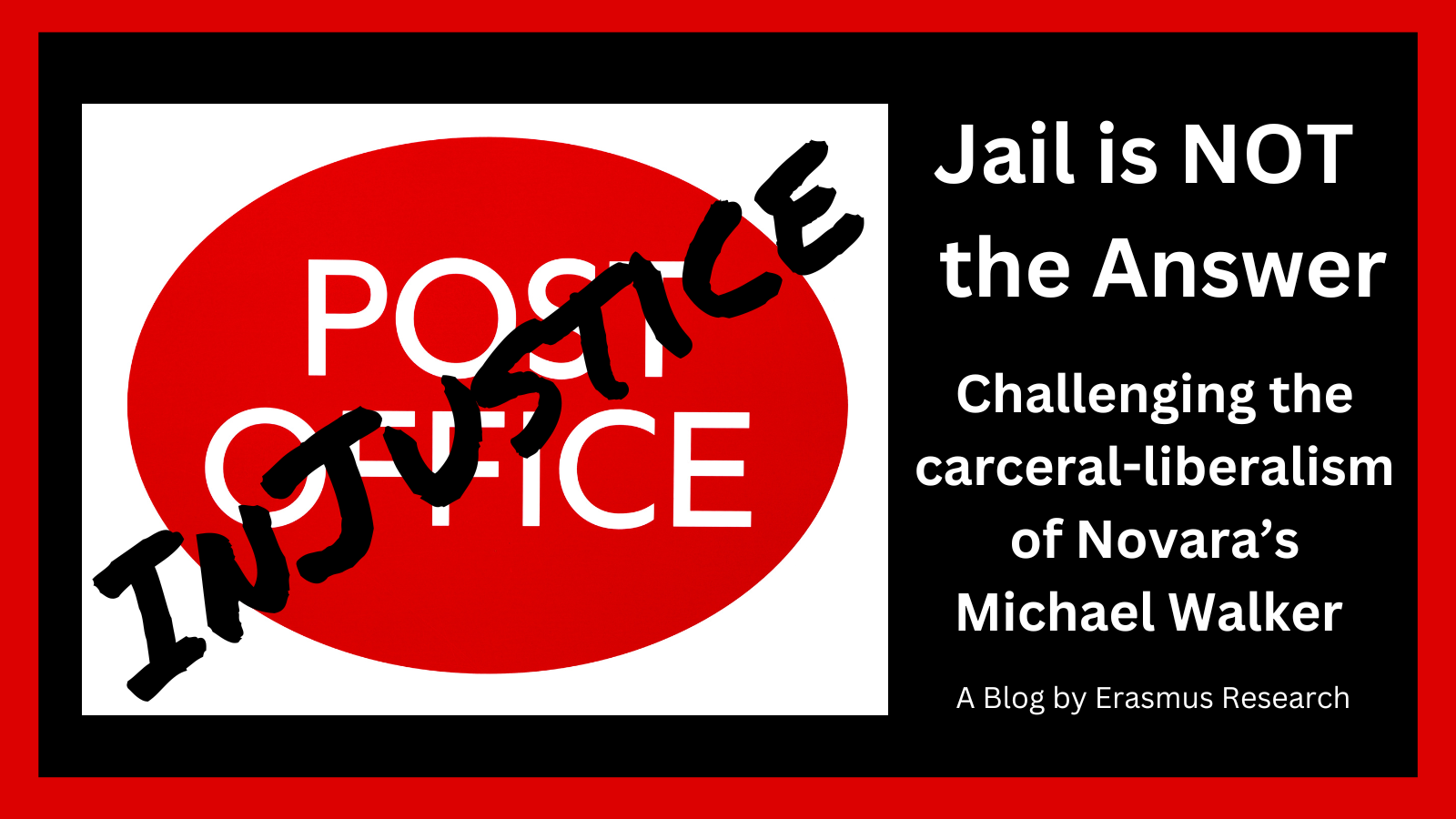Challenging the Carceral-Liberalism of Novara’s Michael Walker.
The prison abolition movement, which has been around since the 1970s, is enjoying something of a revival. One of the most progressive political developments in recent years has been the increase in voices calling for the abolition of the prison estate with different ways to address individuals who may cause harm to others (i.e. different forms of detention). Accompanying this is the demand for a wholesale defunding of the police, redeploying resources used to enforce racial capitalism towards welfare (for example mental health services, family support groups) and other forms of mutual aid work. This call for a conceptual shift can be explained by the increasingly evident failures of the current system, and the growing recognition that prison doesn’t work (and as Foucault reminds us in his seminal book, Discipline and Punish, it was never actually intended to work as claimed by prisons themselves).
There has been a growing awareness, particularly among young people, that the police, the courts and the prison are key institutions of neoliberal governance. In spite of the relentless copaganda on TV and in film, as well as dominating the agenda of most of the printed press, people are beginning to wake up to the political reality of why the wider punishment bureaucracy exists as it does. Notably, there is growing awareness of why it targets certain groups and not others, and why it criminalises petty acts at the bottom of the social structure while ignoring the significant harms caused to all of society by those at the top.
Two of the most progressive movements to emerge from this awakening are embodied by contemporary currents within both anti-carceral feminism and anti-carceral veganism. Based on ongoing social movements, the anti-carceral positions of both are founded upon their firm belief that locking up perpetrators of gender-based violence, and seeking to jail those who cause harm to animals is counterproductive. Carceral solutions neither serve the interests of ‘justice’ nor the interests of keeping human and non-human animals safe. The punishment system makes everything worse.
One of the most important contributions these movements make to the field of political activism lies in their ability to demonstrate the extent to which all forms of oppression are intimately connected. The carceral state, punitive paternalism, patriarchal power and capitalist exploitation are all entangled and enmeshed. If you want to end capitalism, you must abolish the patriarchy and the authoritarian institutions through which punitive paternalism is enforced. Similarly, as the excellent book Vegan Entanglements so brilliantly demonstrates, in order to free animals from cages, you first need to free human animals from cages. All these forms of harm are inextricably linked.
Challenging Michael Walker’s carceral-liberalism
It is surprising, therefore, that a normally outspoken and critically focused presenter at Novara Media, Michael Walker, has consistently resisted the abolitionist vision, by openly stating, whenever the subject is brought up, that he still believes that society needs policing and punishment.
Given his carceral liberal stance, it should not therefore be as surprising as it is then, to hear Michael Walker suggesting that those responsible for the Post Office scandal, should, in his own words; ‘get a taste of prison too.’ Michael Walker qualifies this by saying prison for those culpable does not simply denote an ‘eye for an eye’, retaliatory position, but rather aims to act as a deterrent in which bosses will be more reluctant to lie and cover up their own mistakes, malpractices and criminal injustices.
This is not an ad hominem attack on Michael Walker who, with relentless regularity, does an excellent job on Novara Live, exposing the total inadequacy of the legacy media, with his journalistic brilliance. However, carceral liberalism must be challenged. There can be no place for carceral liberalism in the left’s vision of a future free from patriarchy, punishment and oppression.
Understanding the link between Patriarchal Capitalism and the Carceral State.
Capitalism is a political and economic system that is entirely founded upon primitive accumulation, colonial appropriation and in many cases, naked acts of open theft. The legal system and the corresponding system of punishment is designed to facilitate this looting, robbery and theft at the top of the social and economic structure, while preventing the same from happening at the bottom. In short, the so-called ‘crime control’ system, has been designed by powerful elites, to serve nothing but the interests of those powerful elites.
That the Post Office scandal was able to play out in the way it did, with those responsible for overseeing the UKs biggest miscarriage of justice paid exorbitant bonuses for convictions and CEO Paula Vennells being rewarded with a CBE, (which the weight of public outrage has subsequently forced her to hand back), is testimony to the extent to which the so-called ‘justice system’ exists to serve the interests of power.
Thousands of people’s lives were ruined by the Post Office. A tragedy made possible because the so-called ‘justice system’ has been designed to facilitate a laissez-faire approach to those who occupy favourable positions in the socio-economic structure while practicing a rigid and draconian form of punitive paternalism for those who lack such privilege. The fact that hundreds of innocent sub post masters were encouraged by their lawyers to plead guilty in order to avoid jail is a damning indictment on the current state of the British ‘justice’ system. That many innocent people still went to prison despite following the advice of their lawyers, exposes the true extent to which the state has velvet gloves for dealing with those at the top of the social structure and an iron fist for those at the bottom.
To call for those responsible for the Post Office scandal to face the sanction of prison would be to call for an exception to be made in an outdated system, rather than supporting an argument for a new and radical alternative. Imprisonment in this case, would only further the illusory nature of the system, bolstering its legitimacy and strengthening the mythology that belies it. It also reveals a level of political naivety from Walker that, when placed in the context of what his co-hosts and fellow commentators are all saying in relation to policing and the wider punishment bureaucracy, exposes a deep vein of liberal thought that is so out of step with progressive left thinking it really should be challenged.
As a starting point for learning about both prison abolition and the abolition of the police, the organisation, Abolitionist Futures has a number of brilliant resources all of which can be found in the link below.







